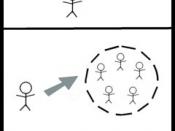This experiment was conducted to determine whether individuals perform better working alone or in a group. The study was to see whether social loafing or social facilitation; two major research topics amongst social psychologists, occurs in certain situations, and the effects on a persons? ability to learn and perform. Through careful research and experimentation it was concluded that social facilitation supported the hypothesis, and social loafing did not.
The Effects of Social Loafing and Social Facilitation in Certain Situations A widespread topic among social psychologists is the influence of groups on individual behaviour. A common question most researchers ask is whether working in a group affects the performance of the individuals. Most researchers can?t answer that question, because it all depends on the individual himself, and the situation they are in. Based on that question, researchers identified two well-known theories: social loafing and social facilitation.
Social loafing and social facilitation affect people in different ways.
Whether it?s their learning abilities or how they perform, some situations will result in different outcomes for certain individuals. In specific situations, whether it is being watched by others, being timed, working in a group or alone everyone acts a certain way.
Social loafing occurs when a person working in a group doesn?t perform to the best of their ability and contributes less ideas and effort then the others working in that group. (Gagne & Zuckerman, 1999 p. 525) A common reason as to why a person would do this is because they think the group will not be marked individually, therefore putting less effort in the group because he knows he will get the same mark as the rest of the other members.
Social facilitation occurs when people put fourth more effort while working in a group then being on their own. (Gagne et...


